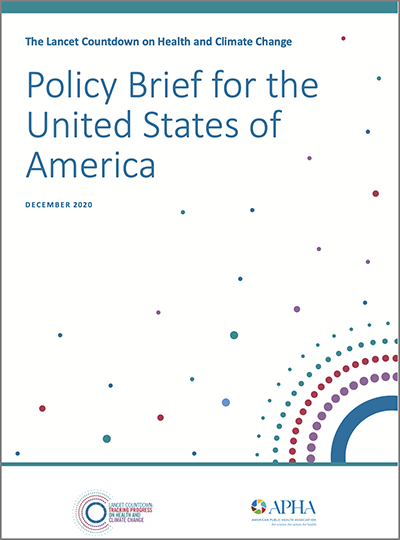Lancet U.S. Policy Brief 2020
The Lancet Countdown on Health and Climate Change
Policy Brief for the U.S. December 2020
 The third Lancet Countdown U.S. Policy Brief (Lancet U.S.) was released on December 3, 2020. Significant revelations from the metrics tracked by Lancet include:
The third Lancet Countdown U.S. Policy Brief (Lancet U.S.) was released on December 3, 2020. Significant revelations from the metrics tracked by Lancet include:
- In the past two decades, heat-related mortality for older persons has almost doubled, reaching a record high of 19,000 deaths in 2018.
- Individuals in the U.S. experienced 1.85 billion more person-days (one person experiencing one day) of exposure to high wildfire risk in 2016-2019 compared to 2001-2004, which is a 19% increase.
- A conservatively estimated total of $45 billion dollars of potential earnings were lost in U.S. productivity in four economic sectors in 2015 due to excessive heat.
- U.S. health professionals and researchers are engaging at the intersection of climate change and health more than ever before with a nearly eight-fold increase in research publications on climate change and health between 2007 and 2019.
Key Lancet U.S. recommendations are that the U.S. should rapidly and urgently implement the following recommendations in an equitable and just fashion so that every person can live with dignity and in good health.
1. Transition to healthy, sustainable agricultural practices: Implement agriculture policies and invest in programs that can foster improved health from a reduction in particulate air pollution and GHG emissions, such as reducing the need for nitrogen fertilizers. The agriculture sector contributed to more than 12,000 premature deaths* in the U.S. in 2018 from the tiny, health-harming air pollution particles known as particulate matter 2.5 microns in size, or PM2.5. The primary source of agricultural air pollution is ammonia, which combines with pollutants from combustive sources, such as vehicles and power plants, to create PM2.5. This ammonia arises largely from livestock, their manure, and the application of synthetic nitrogen fertilizer to cropland. In addition, agricultural production and the associated deforestation to create land for crops and livestock accounted for almost 12.5%†† of all U.S. GHG emissions in 2018. The agricultural sector is also the leading source of two major GHGs, methane (CH4) and nitrous oxide (N2O), which are nearly 85 to 265 times** more potent than carbon dioxide (CO2), respectively. Agricultural interventions that address climate change offer broad health benefits.
2. Remove U.S. fossil fuels subsidies: Eliminate fossil fuel subsidies and reduce investments in new fossil fuel exploration and production. The U.S. is making progress towards zero-carbon electricity generation: low-carbon sources of electricity generation rose to a record high 35%* in 2017, and renewable sources (excluding hydroelectric) rose to nearly 9%*.
3. Shift to zero-carbon electricity: Urgently transition to zero-carbon electricity generation by 2035 that is affordable for all.
4. Increase access to healthy transport options: Rapidly invest in enhanced active transport infrastructure and affordable, accessible zero-carbon public transportation, electric vehicles, and charging stations. While the use of electricity for road transport increased by over 40 times* in the decade since 2007, just 0.06% of the energy used for road transport* in 2017 was electric.3 Thus, the vast majority of road transport energy came from fossil fuels, which, in addition to GHGs, contributed to over 12,000 premature deaths* in the U.S. in 2018 from transport-related PM2.5.
5. Strengthen the public health system: Increase and sustain investments in public health to protect against the accelerating health threats of climate change. In 2018-19, the U.S. spent nearly $13 per person on climate change adaptation in the health sector, far less than what is needed to prevent the growing health impacts of climate change.
6. Invest in a healthy recovery from the COVID-19 pandemic: Implement a ‘quadruple benefit’ COVID-19 recovery plan that works toward a stable climate, protects public health, promotes a sustainable economy, and creates an equitable society.
Visit Lancet Countdown Website>
***
* Source: Lancet Countdown on Health and Climate Change 2020: Policy Brief for the United States of America by Renee N. Salas, Paige Knappenberger Lester, Jeremy J. Hess.
